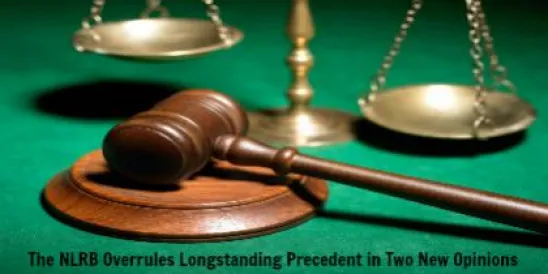On December 12, 2012, the National Labor Relations Board (“NLRB”) overruled a 50–year-old precedent when it decided that employers have a duty to continue to deduct union dues from employees’ paychecks even after the expiration of the collective bargaining agreement that contained such a requirement. See WKYC-TV, Inc. 359 NLRB No. 30 (2012) overruling Bethlehem Steel, 136 NLRB No. 1500 (1962). A week later, the NLRB changed course on 30-year-old precedent when it determined that witness statements obtained during an employer investigation were no longer exempt from disclosure in pre-arbitration discovery. See American Baptist Homes of the West, 359 NLRB No. 46 (2012) overruling Anheuser-Busch, Inc., 237 NLRB 982 (1978). Each decision is discussed below.
1. WKYC-TV, Inc. 359 NLRB No. 30 (2012) overruling Bethlehem Steel, 136 NLRB No. 1500 (1962).
For the past 50 years, the NLRB had taken the position that a dues deduction provision in a collective bargaining agreement terminated upon expiration of a collective bargaining agreement. See Bethlehem Steel, 136 NLRB No. 1500 (1962). As such, if the employer and union were unable to reach an agreement by the time the collective bargaining agreement expired, the employer was free to stop deducting dues from employee paychecks and remitting them to the union. Thus, if a union wanted to continue to collect dues while it attempted to negotiate a new agreement with the employer, the union would have to collect the dues itself. This provided the employer with a legitimate bargaining tool.
In overturning Bethlehem Steel, the NLRB stated that “we find compelling statutory and policy reasons to abandon the Bethlehem Steel rule.” The NLRB pointed out that having the dues deduction provision survive the expiration of the collective bargaining agreement helped preserve the status quo, and nothing in federal labor law or policy indicates that dues deduction provisions should be treated less favorably than other terms and conditions of employment for purposes of the status quo rule. The NLRB also noted that Section 302(c)(4) of the National Labor Relations Act, which exempts dues check-off from the Act’s prohibition against employer payments to unions, indicates that Congress intended a dues check-off arrangement would continue beyond the life of the collective bargaining agreement. Because the NLRB was overturning precedent which had been relied upon by employers for 50 years, the NLRB decided that the new rule would only be applied prospectively.
In his dissent, Member Brian Hayes noted that “for 50 years, the Board has held that . . . an employer’s obligation to check off union dues does not survive the expiration of the collective-bargaining agreement. Today, the majority abandons that precedent and instead requires that dues checkoff, once instituted, continue ad infinitum until the parties either agree to discontinue it or reach a valid impasse. I am not persuaded that this disruption of settled law . . . is adequately justified by the majority.”
Based upon the WKYC-TV, Inc. decision, employers must now continue to deduct union dues from employees’ paychecks and remit them to the union even after the collective bargaining agreement expires, while they continue to negotiate a new agreement with the union.
2. American Baptist Homes of the West, 359 NLRB No. 46 (2012) overruling Anheuser-Busch, Inc., 237 NLRB 982 (1978).
For more than 30 years, the NLRB held that witness statements obtained by an employer during an investigation were exempt from disclosure in pre-arbitration discovery. Anheuser-Busch, Inc., 237 NLRB 982 (1978). The rationale behind the rule was to encourage witnesses to make statements without the fear of reprisal or intimidation. “After careful consideration,” however, the NLRB recently concluded that the reasoning in Anheuser-Busch, Inc. was “flawed.” See American Baptist Homes of the West, 359 NLRB No. 46 (2012).
In deciding that witness statements should be turned over in pre-arbitration discovery, the NLRB indicated that under the rules, there is a general obligation to furnish the union with relevant information and the NLRB found that witness statements were not fundamentally different from other types of information deemed discoverable through information requests. The NLRB ultimately concluded that witness statements are discoverable unless the employer establishes that the statements are confidential. As it did with the decision in WKYC TV, Inc., the NLRB decided that the new rule would only be applied prospectively.
In his dissent, Member Hayes noted that abandoning the previous rule would only result in additional litigation. Member Hayes also pointed out that the new rule is in conflict with the EEOC Guidance regarding workplace investigations. In the Guidance, the EEOC is clear that confidentiality is a key component of an effective workplace investigation.
Given the NLRB’s decision in American Baptist Homes of the West, it is advisable for employers to seek counsel in conducting investigations and preparing statements. Employers should not make any promises or assurances to witnesses regarding confidentiality. Witnesses should be reminded, however, that they cannot be retaliated against for cooperating with an investigation.



 />i
/>i

